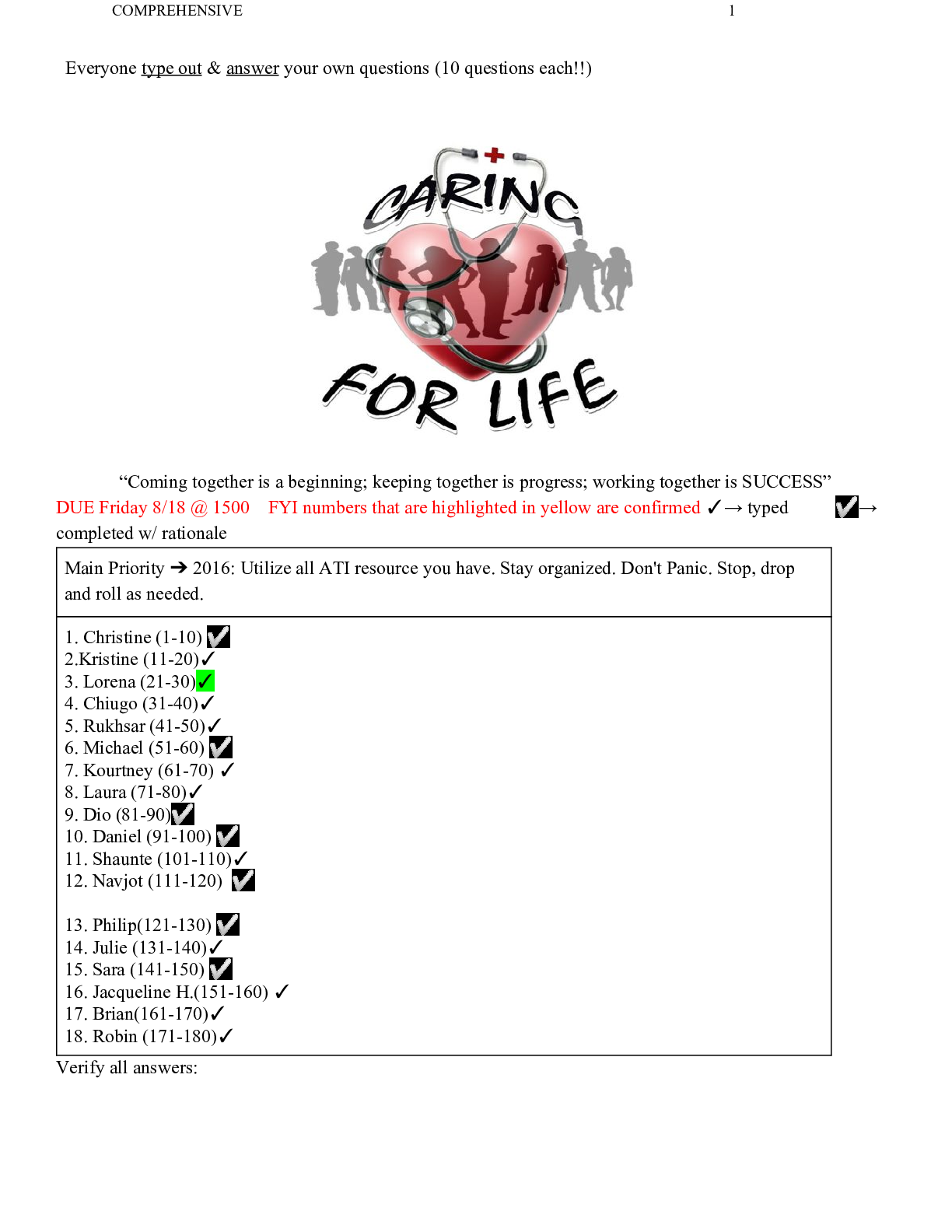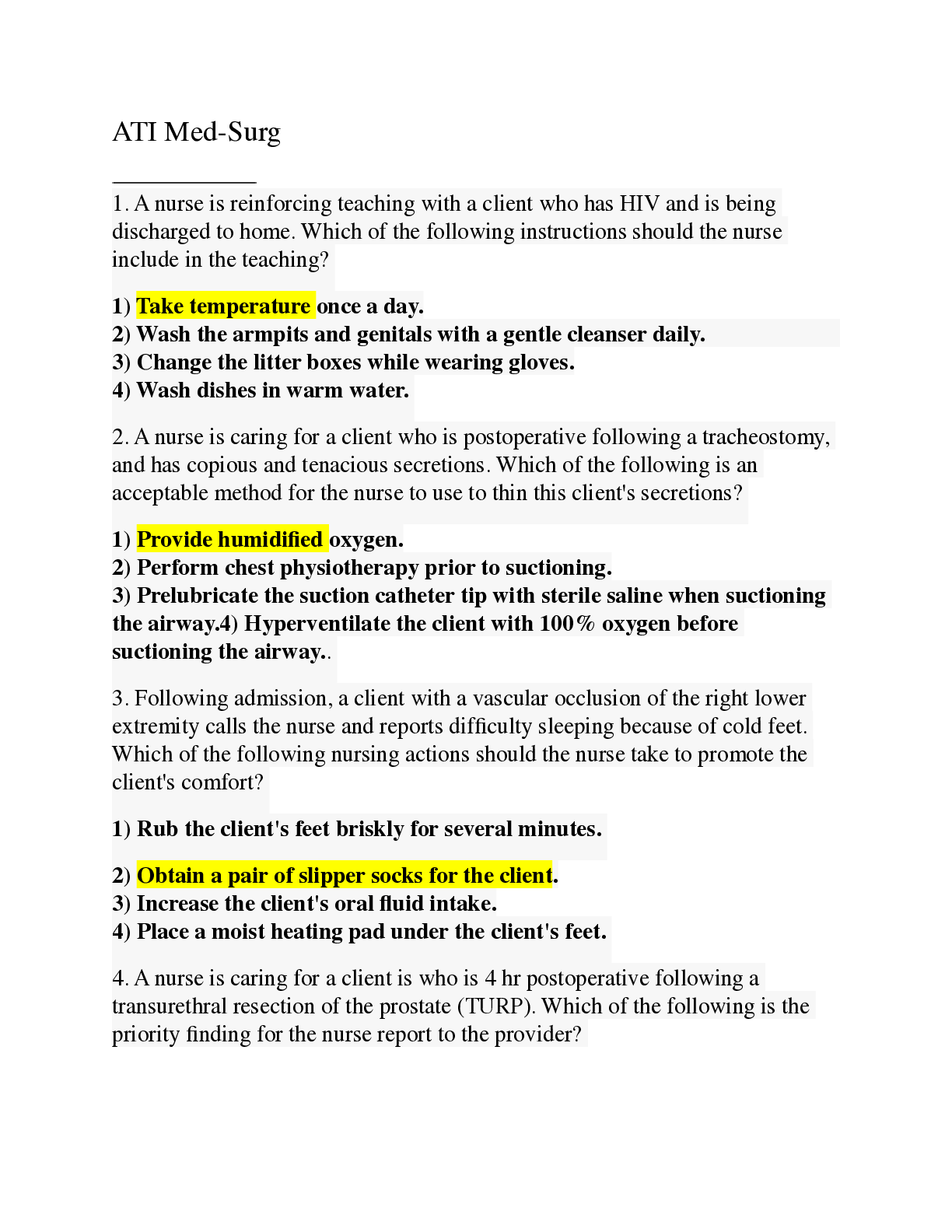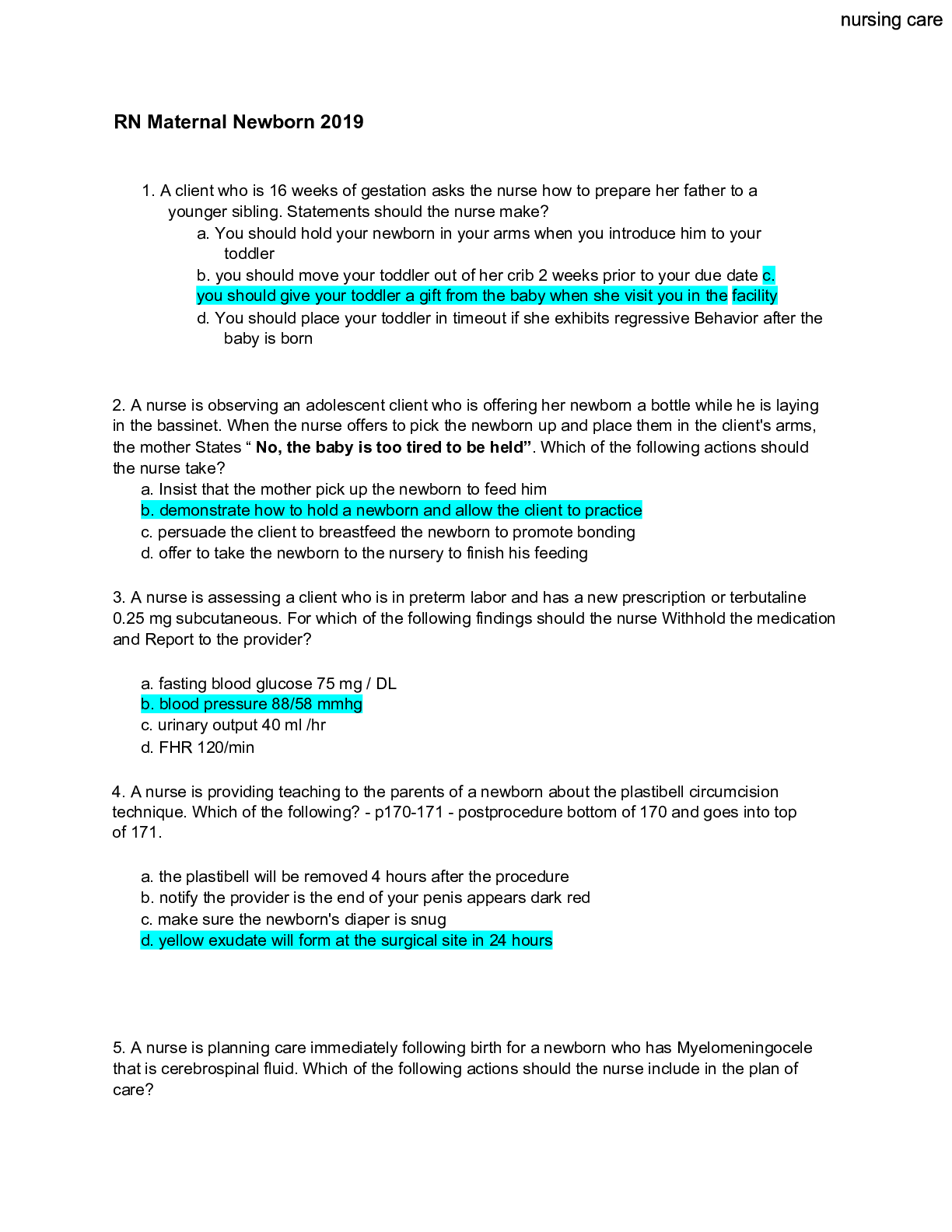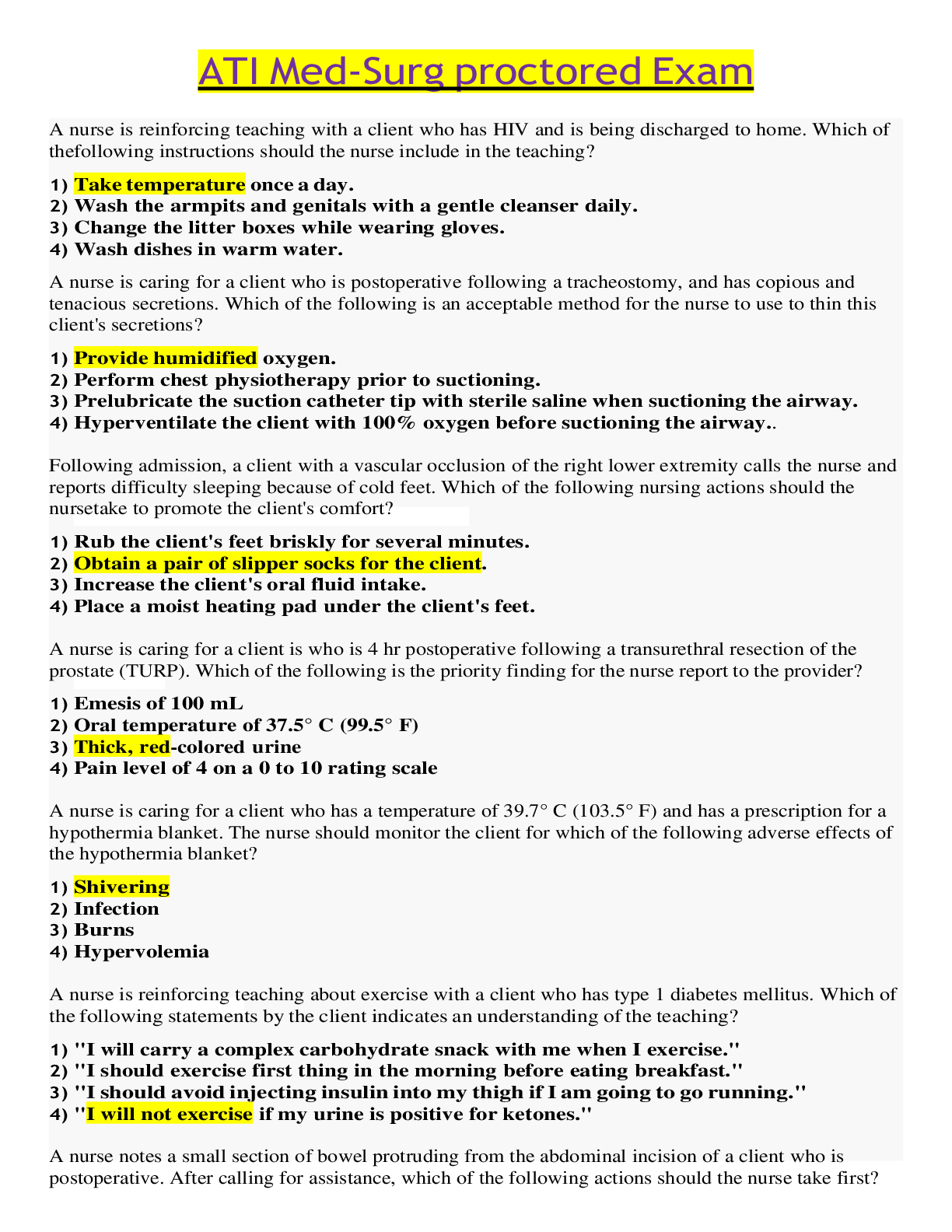*NURSING > ATI MEDICAL SURGICAL > ATI Medical Surgical 1500 Midterm 2021/2022. Questions and answers. Graded A+ (All)
ATI Medical Surgical 1500 Midterm 2021/2022. Questions and answers. Graded A+
Document Content and Description Below
ATI Medical Surgical 1500 Midterm 2021/2022. Questions and answers. Graded A+ Week 1 1. A nurse in a prenatal clinic is caring for a client who is at 7 weeks of gestation. The client reports urin... ary frequency and asks if this will continue until delivery. Which of the following responses should the nurse make? a. "It's a minor inconvenience, which you should ignore." i. This is a nontherapeutic response that disregards the client’s concern and offers unwarranted reassurance. b. "In most cases it only lasts until the 12th week, but it will continue if you have poor bladder tone." i. The presence or absence of bladder tone has no bearing on urinary frequency during pregnancy. c. "There is no way to predict how long it will last in each individual client." i. This is a nontherapeutic response that does not provide appropriate information to the client. d. "It occurs during the first trimester and near the end of the pregnancy." i. Urinary frequency is due to increased bladder sensitivity during the first trimester and recurs near the end of the pregnancy as the enlarging uterus places pressure on the bladder. 2. A nurse is caring for an antepartum client whose laboratory findings indicate a negative rubella titer. Which of the following is the correct interpretation of this data? a. The client is not experiencing a rubella infection at this time. i. A negative rubella titer indicates the client is susceptible to the rubella virus. It does not indicate the presence or absence of a rubella infection. b. The client is immune to the rubella virus. i. A negative rubella titer indicates the client is susceptible to the rubella virus. c. The client requires a rubella vaccination at this time. i. Rubella vaccination during pregnancy is contraindicated because of possible injury to the developing fetus. d. The client requires a rubella immunization following delivery. i. A negative rubella titer indicates that the client is susceptible to the rubella virus and needs vaccination following delivery. Immunization during pregnancy is contraindicated because of possible injury to the developing fetus. Following rubella immunization, the client should be cautioned not to conceive for 1 month. 3. A nurse is instructing a woman who is contemplating pregnancy about nutritional needs. To reduce the risk of giving birth to a newborn who has a neural tube defect, which of the following information should the nurse include in the teaching? a. Limit alcohol consumption. i. Alcohol consumption has no effect on the incidence of neural tube defects. It is related to the incidence of other congenital defects and fetal alcohol syndrome (FAS) in newborns of clients who consume alcohol during pregnancy. b. Increase intake of iron-rich foods. i. Iron intake has no effect on the incidence of neural tube defects. A diet low in iron places a client who is pregnant at risk for preterm labor and postpartum hemorrhage. c. Consume foods fortified with folic acid. i. Increased consumption of folic acid in the 3 months prior to conception, as well as throughout the pregnancy, reduces the incidence of neural tube defects in the developing fetus. d. Avoid foods containing aspartame. i. Aspartame in the diet has no effect on the incidence of neural tube defects in a fetus. Clients who have phenylketonuria should be advised to avoid aspartame since it contains phenylalanine. 4. A nurse is caring for a client who is in her first trimester of pregnancy and asks the nurse if she can continue to exercise during pregnancy. Which of the following responses by the nurse is appropriate?a. "Exercising during pregnancy is not recommended." i. Physical activity during pregnancy improves circulation, rest, and relieves boredom. However, risky activities that require precise balance and coordination should be avoided. b. "Daily jogging for up to 30 minutes is fine throughout the pregnancy."i. While weight-bearing exercises might become uncomfortable in the last trimester, they are generally not contraindicated, providing the client stays hydrated and avoids becoming overheated for extended periods. c. "Activities that raise the body temperature, such as saunas and hot tubs, are safe until the third trimester." i. Prolonged or repeated elevations of maternal and fetal temperature can result in birth defects, especially during the first trimester of pregnancy. d. "It is recommended that pregnant clients limit their exercise routine to stretching activities on a mat several times a week." i. Daily moderate exercise throughout pregnancy is recommended. After the fourth month of pregnancy, clients should avoid exercising flat on their back due to the risk of vena cava syndrome. 5. A nurse is caring for a client who is at 6 weeks of gestation with her first pregnancy and asks the nurse when she can expect to experience quickening. Which of the following responses should the nurse make? a. "This will occur during the last trimester of pregnancy." i. A primigravida client should detect fetal movement earlier than the last weeks of pregnancy. b. "This will happen by the end of the first trimester of pregnancy." i. This is too early in the pregnancy for a primigravida client to detect fetal movement. c. "This will occur between the fourth and fifth months of pregnancy." i. Quickening is defined as the first time the client is able to feel her fetus move. In a primigravida client, this usually occurs at 18 weeks of gestation or later. In a multigravida client, this can occur as early as 14 to 16 weeks. d. "This will happen once the uterus begins to rise out of the pelvis." i. The uterus rises out of the pelvis at 12 to 14 weeks of gestation, which is too early for a primigravida client to notice fetal movement. 6. A nurse is caring for a client who is scheduled for a maternal serum-alpha-fetoprotein test at 15 weeks of gestation. The nurse provides which of the following explanations about this test to the client? a. This test assesses fetal lung maturity. b. It assesses various markers of fetal well-being. c. This test identifies an Rh incompatibility between the mother and fetus. d. It is a screening test for spinal defects in the fetus. i. The maternal serum alpha-fetoprotein (MSAFP) screening test is used to identify suspected neural tube defects (NTDs) and abdominal wall defects. These include spina bifida, microcephaly, and anencephaly. This tool is the basis for further testing, such as amniocentesis and specialized ultrasounds. 7. A nurse is caring for a client who has a positive pregnancy test. The nurse is teaching the client about common discomforts in the first trimester of pregnancy as well as warning signs of potential danger. The nurse should instruct the client to call the clinic if she experiences which of the following manifestations? a. Leukorrhea b. Urinary frequency c. Nausea and vomiting d. Facial edema i. Facial edema is a warning sign of a hypertensive condition or preeclampsia and should be reported immediately to the provider. 8. A nurse in a prenatal clinic is caring for a client who is pregnant and asks the nurse for her estimated date of birth (EDB). The client's last menstrual period began on July 27. What is the client's EDB? (State the date in MMDD. For example, July 27 is 0727). a. 0504 i. Using Nägele's rule, the nurse subtracts three months from the date of the last menstrual period, then adds 7 days. July minus 3 months equals April. There are 30 days in April, so 27 + 7 = May 4. The client's EDB is May 4, which would be written as 0504 in the MMDD format. 9. A nurse is providing preconception counseling for a client who is planning a pregnancy. Which of the following supplements should the nurse recommend to help prevent neural tube defects in the fetus? a. Calcium [Show More]
Last updated: 2 years ago
Preview 1 out of 48 pages

Buy this document to get the full access instantly
Instant Download Access after purchase
Buy NowInstant download
We Accept:

Reviews( 0 )
$14.00
Can't find what you want? Try our AI powered Search
Document information
Connected school, study & course
About the document
Uploaded On
Jun 05, 2022
Number of pages
48
Written in
Additional information
This document has been written for:
Uploaded
Jun 05, 2022
Downloads
0
Views
193










